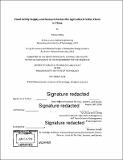Food safety supply and demand across the agricultural value chain in China
Author(s)
Wang, Wenjia.
Download1121594171-MIT.pdf (8.990Mb)
Other Contributors
Massachusetts Institute of Technology. Institute for Data, Systems, and Society.
Technology and Policy Program.
Advisor
Yanchong Karen Zheng.
Terms of use
Metadata
Show full item recordAbstract
This thesis studies the food safety supply and demand in China with the focus on the producing entities and the end consumers. The first chapter concerns different farmers' organizational models and their implications for food safety issues. We conducted three research trips to China and interviewed key personnel from 25 agricultural cooperatives and one agricultural enterprise about the way they organize production activities with farmers. Our findings show that agricultural cooperatives employ a mix of models to mobilize farmers that exert different levels of direct controls over the production activities. We concluded that the choice of model is likely to be based on the difficulty of cultivating certain types of crops. Also, the motivation of agricultural cooperatives in obtaining quality certifications varies based on their position in the value chain: cooperatives that sell directly to end consumers are more motivated to obtain quality certifications than cooperatives selling to downstream processors or distributors. In the case of agricultural enterprise who employs large area of land employ, the contracting farming model is usually adopted. Despite low cost in acquiring land and labor for production, the enterprise has to compromise with a lower level of control over the production activities in the contract farming model. The second chapter studies consumers' response towards different food safety transparency information with respect to different demographic and socio-economical characteristics. The findings suggest that consumers are most likely to respond to seeing organic certificates and the use of organic ingredients in processed products with higher level of purchase intention and a higher willingness to pay. We also found out that respondents who are either male or have children are more likely to respond to food safety information than the other demographic groups..
Description
Thesis: S.M. in Technology and Policy, Massachusetts Institute of Technology, School of Engineering, Institute for Data, Systems, and Society, 2018 Cataloged from PDF version of thesis. Includes bibliographical references (pages 51-55).
Date issued
2018Department
Massachusetts Institute of Technology. Institute for Data, Systems, and Society; Massachusetts Institute of Technology. Engineering Systems Division; Technology and Policy ProgramPublisher
Massachusetts Institute of Technology
Keywords
Institute for Data, Systems, and Society., Technology and Policy Program.